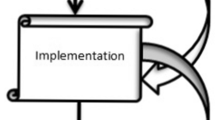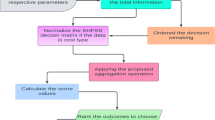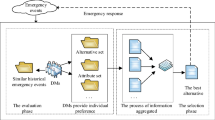Abstract
Dominant emergency action should be adopted in the case of an emergency situation. Emergency is interpreted as limited time and information, harmfulness and uncertainty, and decision-makers are often critically bound by uncertainty and risk. This framework implements an emergency decision-making approach to address the emergency situation of COVID-19 in a spherical fuzzy environment. As the spherical fuzzy set (SFS) is a generalized framework of fuzzy structure to handle more uncertainty and ambiguity in decision-making problems (DMPs). Keeping in view the features of the SFSs, the purpose of this paper is to present some robust generalized operating laws in accordance with the Einstein norms. In addition, list of propose aggregation operators using Einstein operational laws under spherical fuzzy environment are developed. Furthermore, we design the algorithm based on the proposed aggregation operators to tackle the uncertainty in emergency decision making problems. Finally, numerical case study of COVID-19 as an emergency decision making is presented to demonstrate the applicability and validity of the proposed technique. Besides, the comparison of the existing and the proposed technique is established to show the effectiveness and validity of the established technique.

Similar content being viewed by others
Explore related subjects
Discover the latest articles, news and stories from top researchers in related subjects.Data availability
No data were used to support this study.
References
Ashraf S, Abdullah S, Mahmood T (2018) GRA method based on spherical linguistic fuzzy Choquet integral environment and its application in multi-attribute decision-making problems. Math Sci 12(4):263–275
Ashraf S, Abdullah S (2019) Spherical aggregation operators and their application in multiattribute group decision-making. Int J Intell Syst 34(3):493–523
Ashraf S, Abdullah S, Mahmood T, Ghani F, Mahmood T (2019) Spherical fuzzy sets and their applications in multi-attribute decision making problems. J Intell Fuzzy Syst 36(3):2829–2844
Ashraf S, Abdullah S, Abdullah L (2019) Child development influence environmental factors determined using spherical fuzzy distance measures. Mathematics 7(8):661
Ashraf S, Abdullah S, Aslam M, Qiyas M, Kutbi MA (2019) Spherical fuzzy sets and its representation of spherical fuzzy t-norms and t-conorms. J Intell Fuzzy Syst 36(6):6089–6102
Ashraf S, Abdullah S, Mahmood T (2020) Spherical fuzzy Dombi aggregation operators and their application in group decision making problems. J Amb Intel Hum Comp 11:2731–2749
Ashraf S, Abdullah S, Almagrabi AO (2020) A new emergency response of spherical intelligent fuzzy decision process to diagnose of COVID19. Soft Comput. https://doi.org/10.1007/s00500-020-05287-8
Ashraf S, Abdullah S, Aslam M (2020) Symmetric sum based aggregation operators for spherical fuzzy information: Application in multi-attribute group decision making problem. J Intell Fuzzy Syst 38(4):5241–5255
Ashraf S, Abdullah S (2020) Emergency decision support modeling for COVID-19 based on spherical fuzzy information. Int J Intell Syst 35(11):1601–1645
Atanassov KT (1986) Intuitionistic fuzzy sets. Fuzzy Set Syst 20:87–96
Baležentis T, Štreimikienė D, Melnikienė R, Zeng S (2019) Prospects of green growth in the electricity sector in Baltic States: Pinch analysis based on ecological footprint. Resour Conserv Recy 142:37–48
Barukab O, Abdullah S, Ashraf S, Arif M, Khan SA (2019) A new approach to fuzzy topsis method based on entropy measure under spherical fuzzy information. Entropy 21(12):1231
Centers for Disease Control and Prevention, https://www.cdc.gov/coronavirus/2019-nCoV/index.html
Coronavirus COVID-19 Global Cases by the Center for Systems Science and Engineering (CSSE) at Johns Hopkins University (JHU). ArcGIS. Johns Hopkins CSSE. Retrieved 15 NOV 2020
Coronavirus COVID-19 situation of Pakistan and Worldwide, http://covid.gov.pk/stats/global
Cuong BC, Kreinovich V. Picture Fuzzy Sets-a new concept for computational intelligence problems. In2013 Third World Congress on Information and Communication Technologies (WICT 2013) 2013 (pp. 1-6). IEEE
Garg H, Munir M, Ullah K, Mahmood T, Jan N (2018) Algorithm for T-spherical fuzzy multi-attribute decision making based on improved interactive aggregation operators. Symmetry 10(12):670
Garg H (2016) Generalized intuitionistic fuzzy interactive geometric interaction operators using Einstein t-norm and t-conorm and their application to decision making. Comput Ind Eng 101:53–69
Garg H (2016) A new generalized Pythagorean fuzzy information aggregation using Einstein operations and its application to decision making. Int J Intell Syst 31(9):886–920
Garg H (2017) Generalized Pythagorean fuzzy geometric aggregation operators using Einstein t-norm and t-conorm for multicriteria decision-making process. Int J Intell Syst 32(6):597–630
Goala S, Dutta P (2018) Detection of area under potential threat via an advanced aggregation operator on generalized triangular fuzzy number. J Taibah Univ Sci 12(5):536–544
Hussain A, Ali MI, Mahmood T (2020) Pythagorean fuzzy soft rough sets and their applications in decision-making. J Taibah Univ Sci 14(1):101–113
Hwang CL, Yoon K (1981) Methods for multiple attribute decision making. Multiple attribute decision making. Springer, Berlin, pp 58–191
Jan N, Mahmood T, Zedam L, Abdullah L, Ullah K (2021) Analysis of double domination by using the concept of spherical fuzzy information with application. J Ambient Intell Human Comput. https://doi.org/10.1007/s12652-021-03370-y
Jin Y, Ashraf S, Abdullah S (2019) Spherical fuzzy logarithmic aggregation operators based on entropy and their application in decision support systems. Entropy 21(7):628
Jin Y, Wu H, Sun D, Zeng S, Luo D, Peng B (2019) A multi-attribute Pearson’s picture fuzzy correlation-based decision-making method. Mathematics 7(10):999
Jin H, Ashraf S, Abdullah S, Qiyas M, Bano M, Zeng S (2019) Linguistic spherical fuzzy aggregation operators and their applications in multi-attribute decision making problems. Mathematics 7(5):413
Khan S, Abdullah S, Ashraf S (2019) Picture fuzzy aggregation information based on Einstein operations and their application in decision making. Math Sci. 13(3):213–229
Kutlu Gundogdu F, Kahraman C (2019) Extension of WASPAS with spherical fuzzy sets. Informatica 30(2):269–292
Kutlu Gündoğdu F, Kahraman C (2019) A novel VIKOR method using spherical fuzzy sets and its application to warehouse site selection. J Intell Fuzzy Syst 37(1):1197–1211
Qiyas M, Abdullah S, Liu Y, Naeem M (2021) Multi-criteria decision support systems based on linguistic intuitionistic cubic fuzzy aggregation operators. J Ambient Intell Human Comput 12:8285–8303
Rahman K, Abdullah S, Ali A, Amin F (2019) Interval-valued Pythagorean fuzzy Einstein hybrid weighted averaging aggregation operator and their application to group decision making. Comp Intell Syst 5(1):41–52
Rahman K, Abdullah S, Ghani F (2019) Some new generalized interval-valued Pythagorean fuzzy aggregation operators using einstein t-norm and t-conorm. J Intell Fuzzy Syst 37(3):3721–3742
Rahman K, Abdullah S, Khan MSA (2020) Some interval-valued Pythagorean fuzzy Einstein weighted averaging aggregation operators and their application to group decision making. J Intell Syst 29(1):393–408
Rafiq M, Ashraf S, Abdullah S, Mahmood T, Muhammad S (2019) The cosine similarity measures of spherical fuzzy sets and their applications in decision making. J Intell Fuzzy Syst 36:6059–6073
Saaty TL (2008) Decision making with the analytic hierarchy process. Int J Serv Sci 1(1):83–98
Saha A, Majumder P, Dutta D, Debnath BK (2021) Multi-attribute decision making using q-rung orthopair fuzzy weighted fairly aggregation operators. J Amb Intel Hum Comp 12:8149–8171
WHO Coronavirus Disease (COVID-19) Dashboard 2021. https://covid19.who.int/
Yager RR. Pythagorean fuzzy subsets. In2013 joint IFSA world congress and NAFIPS annual meeting (IFSA/NAFIPS) 2013 Jun 24 (pp. 57–61). IEEE
Yager RR, Abbasov AM (2013) Pythagorean membership grades, complex numbers, and decision making. Int J Intell Syst 28(5):436–452
Zadeh LA (1965) Fuzzy sets. Inf control 8:338–353
Zeng S, Hussain A, Mahmood T, Ali MI, Ashraf S, Munir M (2019) Covering-based spherical fuzzy rough set model hybrid with TOPSIS for multi-attribute decision-making. Symmetry 11(4):547
Zeng S, Chen SM, Kuo LW (2019) Multiattribute decision making based on novel score function of intuitionistic fuzzy values and modified VIKOR method. Inf Sci 488:76–92
Zhang X, Xu Z (2014) Extension of TOPSIS to multiple criteria decision making with Pythagorean fuzzy sets. Int J Intell Syst 29(12):1061–1078
Zimmerman TG (1996) Personal area networks: near-field intrabody communication. IBM syst J 35(3.4):609–617
Acknowledgement
This study was supported by Higher Education Commission (HEC), Pakistan under National Research Program for University (NRPU), Project title: Fuzzy Mathematical Modeling for Decision Support Systems and Smart Grid Systems (No. 10701/KPK/NRPU/R&D/HEC/2017).
Author information
Authors and Affiliations
Corresponding author
Ethics declarations
Conflict of Interest
The authors declare that they have no conflict of interest regarding the publication of the research article.
Ethical approval
This article does not contain any studies with human participants or animals performed by any of the authors.
Additional information
Publisher's Note
Springer Nature remains neutral with regard to jurisdictional claims in published maps and institutional affiliations.
Rights and permissions
About this article
Cite this article
Ashraf, S., Abdullah, S. & Chinram, R. Emergency decision support modeling under generalized spherical fuzzy Einstein aggregation information. J Ambient Intell Human Comput 13, 2091–2117 (2022). https://doi.org/10.1007/s12652-021-03493-2
Received:
Accepted:
Published:
Issue Date:
DOI: https://doi.org/10.1007/s12652-021-03493-2




